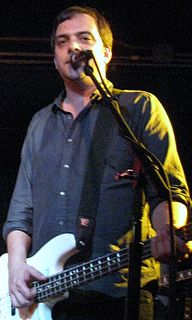Top 60 Quotes & Sayings by Adam Schlesinger
Explore popular quotes and sayings by an American musician Adam Schlesinger.
Last updated on November 25, 2024.
I think people sometimes confuse 'catchy' with something that should automatically be a hit in today's world. I mean, obviously we write a lot of stuff that's catchy, that sticks in your head. But that doesn't necessarily mean that middle-school kids are going to want to listen to a song about a lawyer or a Subaru or whatever.
Yeah, Jody [Porter] left. He's a great guitar player. We have a guy named Phil Hurley who is going to go out on tour with us now. I'm not sure if he'll end up as the permanent guitar player, but he's the type of guy who can kind of step in and play anything. He was with the Gigolo Ants before, and he's really good.
I don't know if there was really ever a golden age of the music business. Most of what was released has always been garbage and some has been able to get through and last. I don't know that it was much better thirty years ago. The music industry just wasn't as efficient. The music industry was more oddball guys who did it for fun and now they are huge corporations that have become more structured.
I think ultimately what you really want is a few people within any label that are into the band enough to really work on it every day for a long time and to actually try a little bit. But obviously, the major labels have more money to spend, so if they feel like spending it, they have bigger resources there when you need them. It doesn't always necessarily translate into them doing a better job for a band, but I think especially if you're playing the game of commercial radio and making videos and stuff like that, that's sort of an expensive proposition.




















